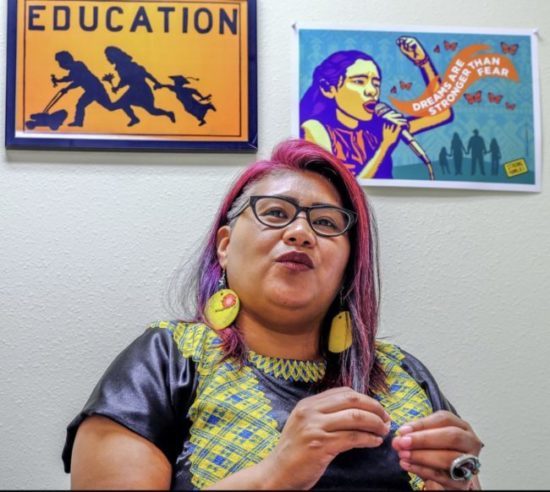Being undocumented doesn’t mean you cannot go to college. College is still an option! The last year has been a very difficult one. As an educator, I have seen first hand the nerve wrecking and growth in anxiety amongst our undocumented communities that range in gender, sexuality, race, ethnicity, and age. I work directly with undocumented students at a four-year university, and it is my goal that their aspirations of a college degree become a reality. I would like to think that I have been around long enough to know that while DACA has been rescinded and is no longer a viable option for our young adults, pursuing a higher education is still feasible, especially in California.
The application deadline for the California State University (CSU) and University of California (UC) systems is just around the corner, November 30th at midnight. Time is of the essence. So if you have a good GPA at least a 2.8 – 3.0, consider applying. If you are low income or come from a working-class family, you may be eligible for a fee waiver. The application is time consuming and will require that you sit down for a few hours. You will need a copy of your transcripts, which for most high schools are accessible online. If you do not know what you want to pursue as a major, that is okay because you can always be ‘undeclared’, take general education courses, and then choose a major.
Now back at the task at hand, how can you attend college? Always remember that you can ask for help if you need it. There are some organizations that can support your efforts. For example, one of the most well known is Educators for Fair Consideration (E4FC), based in Northern California. This organization’s website has an abundance of information such as key terms, scholarships, legislation updates, and resources. It is also a site where you can get connected and learn about other ways to support your efforts to earn a college degree.
For example, when you apply to college, did you know that you must submit the AB540 Affidavit form? And that a new law (SB 68) was just passed in California, SB 68 makes it possible for more students to pay in-state tuition and get state-based financial aid? SB 68 benefits students who did not complete three years of high school or graduate from high school in California by expanding AB 540 eligibility. Yes, the first step is to apply to the university and then complete the AB540 affidavit form. How do you pay? E4FC is a great source for that, although you cannot apply for FAFSA (federal aid) and many will say you need to, you actually apply for the CA Dream Act, you will need parent tax information as well as yours if you have worked. Applying for the CA Dream Act means you can qualify for the Cal Grant (A, B, or C), and you should also apply to the Education Opportunity Program (EOP) at the CSU and UC system or Education Opportunity Programs and Services (EOPS) at the Community College. Please note that you do not need to have DACA in order to apply to college, CA Dream Act Aid, or EOP(S).
Applying to college is the first step. However, while you apply you will also need to be looking and applying for scholarships and other opportunities to fund your education. This is not just something undocumented students need to do, the majority of students also apply to scholarships for college. There are some ways to make this easier, like downloading the DREAMer’s Roadmap app developed by an undocumented student. Another great resource is MyUndocumentedLife website and blog again developed by an undocumented student who is now pursuing her doctoral degree at Harvard. TheDream.us is another great scholarship opportunity that can fund your education for up to four years, but this is dependent on the college you end up attending as the institution needs to be a partner college. National organizations like the Hispanic Scholarship Fund and MALDEF also offer scholarships that you can apply to. Finally, there is more information, specifically resources for undocumented students available from both the CSU and the UC system. The CSU webpage even includes an interactive map that lets you know which campuses have Dream Centers. The majority of UCs have either a center or a program that provides services and support for undocumented students as well. The California Community College system also provides services for undocumented students, however because the community are more independent, it is easier to visit each campus or check out their websites.
While we do not know what decision Congress will make before March 2018, I do know that an education can change your life and that you deserve an opportunity to learn and grow in this society. Whatever you decide, I leave you with these words from César Chávez, “Once social change begins, it cannot be reversed. You cannot uneducate the person who has learned to read. You cannot humiliate the person who feels pride. You cannot oppress the people who are not afraid anymore.”
Mariana Martinez
Latest posts by Mariana Martinez (see all)
- Conozca a Omar Medina, Candidato a Miembro de la Junta Escolar de la Ciudad de Santa Rosa para el Área 4 - October 2, 2018
- Meet Omar Medina, Candidate for Santa Rosa City School Board Trustee for Area 4 - September 26, 2018
- Perfil de Luchadora: Conozca a Ariana Aparicio, Estudiante DACA y Dirigida a Harvard - August 28, 2018
- Luchadora Profile: Meet Ariana Aparacio, DACAmented and Headed to Harvard - August 24, 2018
- La Estudiante de Sonoma State Patricia Ayala Macías, Comparte Por Qué es Importante Que Los Estudiantes Universitarios Participen en el Gobierno Estudiantil - April 6, 2018

